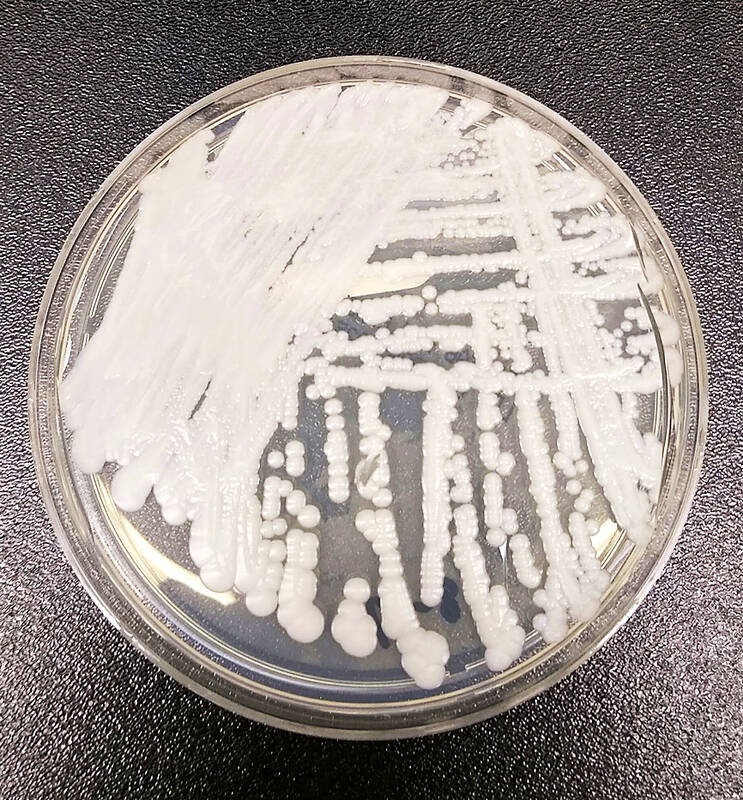Three cases of Candida auris, a fungus that can cause a yeast infection known as candidiasis in humans, have been reported in Taiwan over the past few years, but they did not display drug resistance, Centers for Disease Control (CDC) Deputy Director-General Philip Lo (羅一鈞) said yesterday.
Lo made the statement at a news conference in Taipei, one day after the Washington Post reported that the potentially deadly fungus is spreading in US hospitals.
The fungus was first discovered in Japan in 2009 and poses a danger to immunocompromised people, with an estimated mortality rate of 30 to 60 percent, Lo said.

Photo: AP
Most people infected in the US were hospital patients breathing through respirators or undergoing dialysis, he said, adding that the condition has affected people of all ages from newborns to the elderly.
The first Taiwanese case, reported in April 2018, was a 50-year-old resident of southern Taiwan who tested positive for the fungus following a skin infection, he said.
The man had diabetes and pemphigus, and regularly took prescription steroids and antibiotics, Lo said.
In May 2021, a Taiwanese businessman in his 60s who had returned from Vietnam to get treatment for septic encephalopathy tested positive for the fungus, Lo said, adding that it was the only time a candidiasis case in Taiwan was deemed life-threatening.
The man recovered after receiving intravenous antifungal medication, he said.
The most recent case, reported in February last year, was a resident of southern Taiwan in his 40s, Lo said.
The man tested positive after developing an ear infection with symptoms including discharge from the ear, tinnitus, hearing loss and vertigo, Lo said.
As candidiasis is not recognized as an epidemic, hospitals are not obliged to report infections, potentially leading to cases being unreported, he said.
The fungus can survive on surfaces for weeks, and many of its strains are resistant to multiple types of antifungal drugs, including some that are resistant to all three major groups of medication used to treat candidiasis, Lo said.
Traces of the fungus have been detected in the respiratory systems, urinary tracts and inner organs of healthy people, he said.
The CDC did not identify the infection source of the three Taiwanese cases, Lo added.

The CIA has a message for Chinese government officials worried about their place in Chinese President Xi Jinping’s (習近平) government: Come work with us. The agency released two Mandarin-language videos on social media on Thursday inviting disgruntled officials to contact the CIA. The recruitment videos posted on YouTube and X racked up more than 5 million views combined in their first day. The outreach comes as CIA Director John Ratcliffe has vowed to boost the agency’s use of intelligence from human sources and its focus on China, which has recently targeted US officials with its own espionage operations. The videos are “aimed at

STEADFAST FRIEND: The bills encourage increased Taiwan-US engagement and address China’s distortion of UN Resolution 2758 to isolate Taiwan internationally The Presidential Office yesterday thanked the US House of Representatives for unanimously passing two Taiwan-related bills highlighting its solid support for Taiwan’s democracy and global participation, and for deepening bilateral relations. One of the bills, the Taiwan Assurance Implementation Act, requires the US Department of State to periodically review its guidelines for engagement with Taiwan, and report to the US Congress on the guidelines and plans to lift self-imposed limitations on US-Taiwan engagement. The other bill is the Taiwan International Solidarity Act, which clarifies that UN Resolution 2758 does not address the issue of the representation of Taiwan or its people in

US Indo-Pacific Commander Admiral Samuel Paparo on Friday expressed concern over the rate at which China is diversifying its military exercises, the Financial Times (FT) reported on Saturday. “The rates of change on the depth and breadth of their exercises is the one non-linear effect that I’ve seen in the last year that wakes me up at night or keeps me up at night,” Paparo was quoted by FT as saying while attending the annual Sedona Forum at the McCain Institute in Arizona. Paparo also expressed concern over the speed with which China was expanding its military. While the US

SHIFT: Taiwan’s better-than-expected first-quarter GDP and signs of weakness in the US have driven global capital back to emerging markets, the central bank head said The central bank yesterday blamed market speculation for the steep rise in the local currency, and urged exporters and financial institutions to stay calm and stop panic sell-offs to avoid hurting their own profitability. The nation’s top monetary policymaker said that it would step in, if necessary, to maintain order and stability in the foreign exchange market. The remarks came as the NT dollar yesterday closed up NT$0.919 to NT$30.145 against the US dollar in Taipei trading, after rising as high as NT$29.59 in intraday trading. The local currency has surged 5.85 percent against the greenback over the past two sessions, central